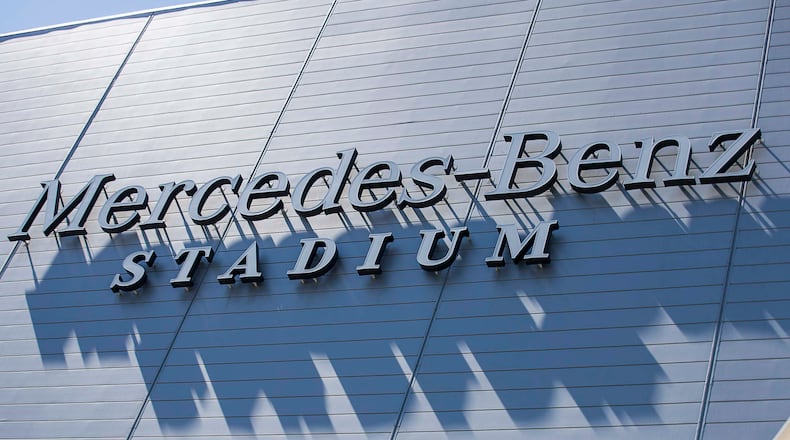The Falcons expect that Mercedes-Benz Stadium’s seating capacity will be reduced to between 10,000 and 20,000 this year because of social distancing, according to the team’s vice president of sales and service Don Rovak.
The stadium’s normal capacity for a Falcons game is more than 71,000.
Rovak also said in an interview with The Atlanta Journal-Constitution that the Falcons expect the reduced capacity to limit each season-ticket holder to attending no more than two or three of the eight scheduled regular-season games.
While it’s not certain that any fans will be at NFL games this fall because of the continuing coronavirus pandemic, the Falcons are proceeding with plans to have some fans in the stadium.
The Falcons previously announced fans can choose between credits and refunds for their 2020 season tickets. The team Wednesday began sending emails to season-ticket account holders asking whether they want to attend some games on a single-game ticket basis and asking those who do to rank the first four games on the regular-season schedule in their order of preference. The plan is to follow up later with another survey regarding the second half of the schedule.
Based on the individual preferences expressed, the overall demand for each game and the seats available at each price point in the reduced capacity, the Falcons said they will hold a random drawing to determine the games to which each season-ticket holder will be eligible to buy tickets. If offered tickets for a given game, a customer will be able to select from available seats and purchase the same number of tickets at the same per-game price as in their season-ticket package. Credits issued for 2020 season tickets can be used to pay for the single-game tickets.
Although season-ticket holders will be offered seats in their same price category -- for example, those whose season tickets were in the lower-level club seats will choose from available seats in those sections -- fans generally won’t get the exact seat as in their season-ticket packages because the reduced capacity will eliminate most seats from the inventory.
“It’s complicated as heck,” Rovak said of the process, but he thinks it’s the fairest way under the circumstances to divvy up limited tickets.
“When you only have 10,000 to 20,000 seats, you need to be thoughtful,” he said. “Is it going to be perfect? Absolutely not. But I do think we’ll provide a level of care that our (fans) will feel, and we’ll be able to justify it for this point in time.”
A big variable is what percentage of personal seat license holders will want to attend games this season in light of COVID-19 and changes in the fan experience that will range from mandatory masks to limited interaction with other fans.
“We understand … this will be very different,” Rovak said. “You’re not high-fiving the guy next to you; you’re not drinking at the bar with strangers you just met; you’re probably not coming early for the pregame show.
“The event (around the game) is secondary; the game is probably at the forefront of the reason you’re coming. There may be people who have no interest in doing that. And that’s fine; that’s why we wanted to provide optionality.”
The Falcons won’t know how the supply-demand equation will work out until they finalize the seating capacity and have the results of the survey asking fans to rank the games they want to attend. But their expectation is that demand will far exceed supply.
“We estimate … that most fans will get one to two games, max, out of the first four,” Rovak said. “We have too many PSL owners to accommodate in a 10,000- to 20,000-seat venue. If we have way less people wanting to go to games, the math might work out. But for the most part, we really don’t see a scenario where (a customer) is getting more than two of the first four games, and one game (out of the four) is very likely. "
Over the course of the eight-game regular-season schedule, getting tickets to two or three games “is probably where we’re at,” he said.
Rovak said family members or others in the same season-ticket account will be able to sit together in adjacent seats; otherwise, there will be six feet of distance between occupied seats. All of the aisle seats will be left vacant. The field-level end-zone suites won’t be used. The first seven to 12 rows of seats along the sidelines will be left empty and covered with banners, putting distance between fans and players.
Final decisions on the seating capacity will depend on NFL requirements, local and state governmental orders and CDC guidelines, according to the Falcons. For now, the team isn’t being more specific than to say it anticipates capacity being in the 10,000-20,000 range for the first four regular-season home games.
“We’re prioritizing safety No. 1,” Rovak said. “We need to make sure we are erring on the side of fan safety.”
A similarly reduced seating capacity is likely for the Chick-fil-A Kickoff college football games scheduled at Mercedes-Benz Stadium in early September, although it’s unclear at this point how many, if any, of those games will be played.
Rovak said the plan is to have the stadium clubs, restaurants, bars and concession stands open at Falcons games, but not the on-field patios. The reduced capacity will translate to smaller gatherings in the clubs.
Plans are still being developed for details such as new concession-stand procedures and new gate-entry processes.
About the Author
Keep Reading
The Latest
Featured

